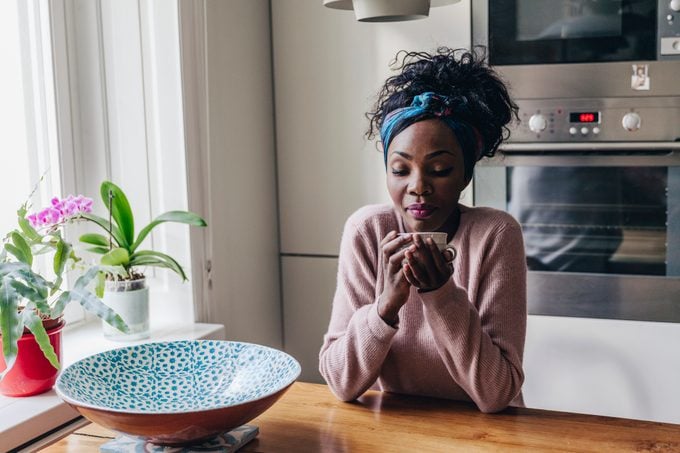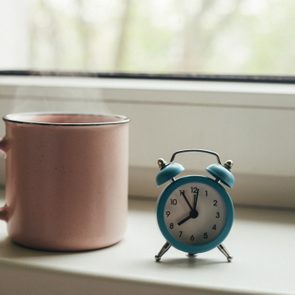Can You Drink Coffee While Fasting?
Updated: Apr. 01, 2021
Many Americans drink some form of java daily, but can you drink coffee while fasting? Here's what dietitians say.
Intermittent fasting and coffee
From cold brew to coffee smoothies, java is becoming an even buzzier beverage. About 62 percent of Americans drink coffee every day and the typical coffee drinker downs three cups daily, according to the 2020 National Coffee Data Trends Report from the National Coffee Association. That’s about 5 percent more than we drank in 2015.
Just as interest in coffee is percolating, so is the popularity of intermittent fasting. (It was Google’s most-searched diet of 2019.) That begs the question: Can you combine these two trends by drinking coffee when you start intermittent fasting? Yes and no.
“Just like with tea, unsweetened coffees will not break a fast,” says Autumn Bates, a certified clinical nutritionist in Manhattan Beach, California. “And sweetened coffees will break a fast.”
What is intermittent fasting?
Clues to the benefits of intermittent fasting date back to decades of studies in rodents. Those findings suggest that time-restricted eating may reduce risks for aging-related illnesses while extending overall lifespan. These benefits are attributed to a concept called “metabolic switching.” Generally, after about 10 hours of fasting, the body runs out of its glycogen stores and begins burning ketones, a fuel made from fat by the liver. This kicks the body into what’s known as “ketosis,” something you may have heard about when starting the keto diet.
While many scientists have uncovered these and other health benefits from intermittent fasting—including potential weight loss and lower risk for type 2 diabetes—a review of studies published in 2019 in the New England Journal of Medicine hints at the fact that it’s tough to prove that this all translates to humans. A study in a 2020 issue of JAMA Internal Medicine found that following the 16:8 style of intermittent fasting can lead to weight loss among those who are overweight and obese. But so can consistently-timed meals.
Five types of intermittent fasting
-
Time-Restricted Eating: This typically takes the form of the 16:8 plan (fast for 16 hours and eat normally for the next eight hours) or the 14:10 plan (fast for 14 hours and eat normally for the next 10 hours). It’s also known as the time-restricted fasting (TRF) diet.
-
Eat Stop Eat: Fast for 24 hours once or twice a week. On the other days, eat normally.
-
Alternate-Day Fasting: Consume about 500 calories every other day, then eat normally on the alternate days.
-
5:2 Fasting: Eat normally for five days of the week and fast for two non-consecutive days (such as Tuesday and Thursday).
-
The Warrior Diet: Consume all of your calories within a four-hour window each day.
Intermittent fasting is more about the “when” than the “what.” During regular eating windows or days, there are usually no calorie or food restrictions. During fasting times, however, the calorie range is typically between zero and about 500 calories. You call the shots on how to allocate those calories (i.e., on food and/or drink).

Can you drink coffee while intermittent fasting?
“Coffee can be consumed during a fast if it’s black,” says Ashley Reaver, RD, an Oakland, California-based registered dietitian and creator of the Lower Cholesterol Longer Life Method. “No sweeteners, creams, or milks should be added because they contain calories, which will end the fasting period,”
As with any intermittent fasting drinks, anything goes when you’re in your fueling window as long as it fits within your calorie range. During fasting periods, zero-calorie beverages or drinks that are pretty close to zero calories—like tea and lemon water while fasting—are OK.
An eight-ounce cup of coffee contains about 100 milligrams of caffeine, negligible macronutrients, and about two calories. Black coffee can be good for you. A consistent coffee routine has been linked to a brighter mood, sharper brain, and lower risk for type 2 diabetes. It also counts toward your daily hydration goal.
At its essence, black coffee alone is unlikely to break your fast. Common additives certainly could, though.
“But be cautious while getting a coffee at many popular coffee shops,” says Bates. “Many cold brew options come pre-sweetened.”
Nearly every coffee shop order of a latte, cappuccino, frappe—any drink with even a splash of milk, creamer, or sweetener—has enough calories to kick your body out of ketosis, and break a fast. So stick with coffee straight-up. If you’re craving a flavor boost, consider one of these low-calorie ways to flavor coffee, such as a dash of cinnamon or cayenne pepper.
How much coffee to drink while intermittent fasting
Up to three cups of coffee per day is associated with a 19 percent lower risk of death from heart disease, according to a study published in 2019 in Nutrition Reviews. Many other studies have found the benefits max out at about that amount. (Jitters from coffee and other hidden sources of caffeine, as well as potential impacts on sleep, begin to rise at more than four cups.)
Who should—and shouldn’t—intermittent fast?
As mentioned, the intermittent fasting benefits may include slower aging or fewer aging-related diseases and weight loss. To possibly score any or all of those, you have to be able to stick with it for the long haul. That isn’t exactly easy if you enjoy sharing dinner with loved ones and can only eat for four hours each day.
“Like most things in nutrition, whether or not intermittent fasting is healthy really depends on the person,” says Reaver. “It can be a useful tool for individuals trying to lose weight that struggle with late-night eating because it restricts the time period of calorie intake. Individuals recovering from an eating disorder or disordered eating should not engage in intermittent fasting as it is another restrictive behavior. Athletes or individuals that require a high caloric intake should also not engage in intermittent fasting.”
Those who are pregnant or breastfeeding, people with a history of seizure disorders, and those with diabetes or any blood sugar-related condition should also steer clear.
As with any eating plan, check with a registered dietitian or your doctor before starting an intermittent fasting plan.
The final word on intermittent fasting and drinking coffee
“Black coffee can be enjoyed while fasting, just stick to a modest amount,” says Leigh Merotto, RD, a Toronto-based registered dietitian with a focus on metabolic health, digestion/gut health, and sports nutrition. “Too much caffeine can cause poor sleep and irritability, especially if consumed on an empty stomach.”
Be sure to tune into your body and your reasons for drinking coffee. Ask yourself:
-
Am I relying on coffee to fill my empty, growling stomach while fasting?
-
Am I addicted to the caffeine-triggered energy boost?
-
Do I experience severe headaches without it?
If you answered “yes” to any of the above, it’s likely time to dial back and drink more water. You may also want to consider another way to eat (like this dietitian’s healthy eating plan) that allows you to fuel your body more consistently.





















